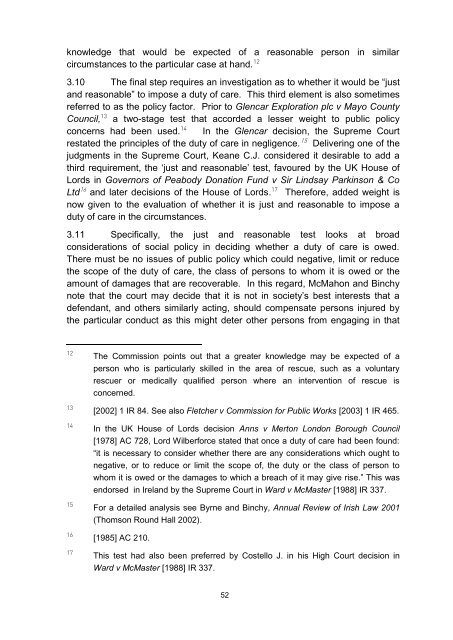civil liability of good samaritans and volunteers - Law Reform ...
civil liability of good samaritans and volunteers - Law Reform ...
civil liability of good samaritans and volunteers - Law Reform ...
You also want an ePaper? Increase the reach of your titles
YUMPU automatically turns print PDFs into web optimized ePapers that Google loves.
knowledge that would be expected <strong>of</strong> a reasonable person in similarcircumstances to the particular case at h<strong>and</strong>. 123.10 The final step requires an investigation as to whether it would be “just<strong>and</strong> reasonable” to impose a duty <strong>of</strong> care. This third element is also sometimesreferred to as the policy factor. Prior to Glencar Exploration plc v Mayo CountyCouncil, 13 a two-stage test that accorded a lesser weight to public policyconcerns had been used. 14 In the Glencar decision, the Supreme Courtrestated the principles <strong>of</strong> the duty <strong>of</strong> care in negligence. 15 Delivering one <strong>of</strong> thejudgments in the Supreme Court, Keane C.J. considered it desirable to add athird requirement, the „just <strong>and</strong> reasonable‟ test, favoured by the UK House <strong>of</strong>Lords in Governors <strong>of</strong> Peabody Donation Fund v Sir Lindsay Parkinson & CoLtd 16 <strong>and</strong> later decisions <strong>of</strong> the House <strong>of</strong> Lords. 17 Therefore, added weight isnow given to the evaluation <strong>of</strong> whether it is just <strong>and</strong> reasonable to impose aduty <strong>of</strong> care in the circumstances.3.11 Specifically, the just <strong>and</strong> reasonable test looks at broadconsiderations <strong>of</strong> social policy in deciding whether a duty <strong>of</strong> care is owed.There must be no issues <strong>of</strong> public policy which could negative, limit or reducethe scope <strong>of</strong> the duty <strong>of</strong> care, the class <strong>of</strong> persons to whom it is owed or theamount <strong>of</strong> damages that are recoverable. In this regard, McMahon <strong>and</strong> Binchynote that the court may decide that it is not in society‟s best interests that adefendant, <strong>and</strong> others similarly acting, should compensate persons injured bythe particular conduct as this might deter other persons from engaging in that121314151617The Commission points out that a greater knowledge may be expected <strong>of</strong> aperson who is particularly skilled in the area <strong>of</strong> rescue, such as a voluntaryrescuer or medically qualified person where an intervention <strong>of</strong> rescue isconcerned.[2002] 1 IR 84. See also Fletcher v Commission for Public Works [2003] 1 IR 465.In the UK House <strong>of</strong> Lords decision Anns v Merton London Borough Council[1978] AC 728, Lord Wilberforce stated that once a duty <strong>of</strong> care had been found:“it is necessary to consider whether there are any considerations which ought tonegative, or to reduce or limit the scope <strong>of</strong>, the duty or the class <strong>of</strong> person towhom it is owed or the damages to which a breach <strong>of</strong> it may give rise.” This wasendorsed in Irel<strong>and</strong> by the Supreme Court in Ward v McMaster [1988] IR 337.For a detailed analysis see Byrne <strong>and</strong> Binchy, Annual Review <strong>of</strong> Irish <strong>Law</strong> 2001(Thomson Round Hall 2002).[1985] AC 210.This test had also been preferred by Costello J. in his High Court decision inWard v McMaster [1988] IR 337.52
















